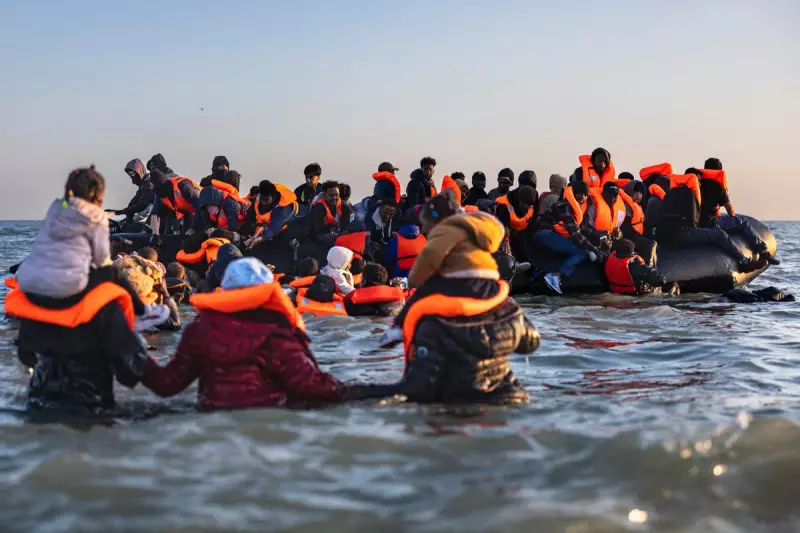
Controversial Nets Deployed Despite Fears of Fatalities
French law enforcement officers have been equipped with large 'arresting nets' designed to stop small boats carrying migrants across the English Channel, despite serious warnings from experts that the tactic could lead to deaths. The nets, which can be up to 30 metres wide, have been available since Spring and represent a significant escalation in maritime interception methods.
This development comes as France faces mounting pressure from the UK government to intercept more migrant vessels at sea. The Labour administration has been intensifying efforts to deter illegal Channel crossings through a fresh crackdown, creating substantial political pressure on Emmanuel Macron's government to take more decisive action.
How the Net Interception System Works
According to sources within the French Ministry of Interior, five or six specialised teams will patrol the coastline with specific equipment for these operations. Each team will include a maritime gendarmerie vessel to carry out the interceptions and a French Navy vessel standing by to provide assistance if needed.
The training manual from the company supplying the nets explains they can "neutralise simultaneously" one or more boats by blocking their propellers. The technique involves the intercepting boat passing the target vessel before deploying the net when positioned 10-20 metres ahead, effectively capturing and immobilising what the documents describe as "high-speed vessels."
French authorities have established specific criteria that must be met before interventions can occur. Officials must demonstrate the boat is unsuitable for its journey, confirm it's not a pleasure craft or fishing vessel, and establish through its trajectory that it's attempting to pick up migrants from beaches.
Serious Safety Concerns and Union Opposition
French coast guard representative Rémi Vandeplanque delivered a stark warning about the dangers of these tactics. "There is no way to carry out such manoeuvres safely," he stated unequivocally. "Whatever you do, you will create panic or distress, and one day there will be a disaster. The first time, maybe it will be okay, once or twice. But it's clear that one day there will be fatalities caused by this."
Vandeplanque emphasised the particular risks when dealing with overcrowded dinghies typically carrying at least 50 people. "You can imagine the panic on board. If you pass in front of a dinghy, you will make waves. It is not possible to do this really safely. It will be dangerous regardless."
The Solidaires Douanes union has formally condemned France's plans to intercept small boats at sea, describing them as "inhumane" and "absurd" in a letter to French customs general director Florian Colas dated 30 September. The union warned these tactics "risk causing shipwrecks and deaths, for which the moral and criminal responsibility would rest entirely on the personnel in charge of carrying out the interventions."
Even the gendarmerie officers tasked with executing these interceptions are reportedly concerned about potential casualties and fear facing criminal prosecutions should deaths occur. Sources indicate that police are seeking legal guarantees, though ministry officials acknowledge that obtaining such protection from prosecutors would be "impossible."
Mounting Pressure and Political Context
The controversial measures emerge against a backdrop of increasing UK pressure on France to implement tougher border security measures. A French government source revealed that "The Brits are putting pressure on everyone, from the most junior project manager to the ministry himself."
This pressure has financial implications, with the release of British funds to France said to be contingent on Paris providing assurances of a stronger maritime security presence. The current funding cycle for securing the Franco-British border concludes in March, adding urgency to the negotiations.
The strategy will initially target so-called 'taxi boats' that travel along the coastline collecting migrants at various locations. These vessels have become increasingly prevalent, with French authorities reporting that more than 56% of people who reached the UK in 2025 were transported on such boats.
Meanwhile, the UK government faces its own pressures, with nearly 40,000 people having made the perilous Channel crossing so far in 2025 – a 19% increase compared to 2024 figures. Home Secretary Shabana Mahmood recently unveiled hardline measures aimed at discouraging asylum seekers, though these have prompted backlash from some Labour MPs who believe the proposals go too far.
The cooperation between Sir Keir Starmer and Emmanuel Macron has intensified, with the leaders announcing plans for a 'one-in-one-out' returns agreement during a joint press conference over the summer. This arrangement would see some asylum seekers returned to France after crossing the Channel, acknowledging what Mr Macron described as a "burden" for both nations.
Tragically, the urgency of these measures is underscored by the human cost. According to French data, twenty-six people have died during crossing attempts so far in 2025, with most deaths occurring near the coast due to drowning or asphyxiation on overcrowded boats.





